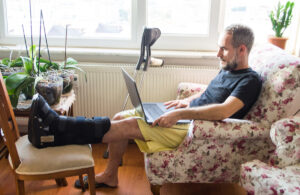 Remote working, telecommuters and stay-at-home workplaces have become a new reality for many in the midst of the COVID-19 pandemic. However, an issue that many workers are juggling with is, what happens if you’re injured working from home? Will your employers’ workers’ compensation insurance still cover your injury, or will you be forced to turn to your private health insurance policy? What stands true with most legal cases, is that it all depends on your specific situation and case. The workers’ compensation attorneys at Hollington Brown in Augusta are dedicated to pursuing your workers’ compensation claim and securing the compensation you deserve.
Remote working, telecommuters and stay-at-home workplaces have become a new reality for many in the midst of the COVID-19 pandemic. However, an issue that many workers are juggling with is, what happens if you’re injured working from home? Will your employers’ workers’ compensation insurance still cover your injury, or will you be forced to turn to your private health insurance policy? What stands true with most legal cases, is that it all depends on your specific situation and case. The workers’ compensation attorneys at Hollington Brown in Augusta are dedicated to pursuing your workers’ compensation claim and securing the compensation you deserve.
Typical workers compensation coverage criteria
Workers’ compensation is a no-fault system, which means that if you’re injured in the “course and scope of employment,” you’re typically covered under your employer’s workers’ compensation insurance, regardless of your own negligence, or someone else’s, played a role in the accident.
In general, employees are covered for work-related injuries that occur outside the office or other workspace. The primary consideration in these cases becomes whether the injury is actually work-related. If you’re trying to prove that your injury was suffered while working from home, it could get complicated, especially when it could have occurred anytime you were home and on the clock.
Some questions to consider that will determine whether an injury is work-related include:
- Was the employer benefitting from the employee’s actions when the injury occurred?
- Did the employer require the employee to engage in the injury-causing activity?
- Did the employer approve the off-site activity in advance?
For example, if you’re injured in the company’s break room while having your lunch on-site, workers’ compensation will usually cover those injuries because it benefits your employer when you take your lunch break at the office (it saves time and keeps you accessible to your team if a need arises while you’re on break). Even if you’re injured on your employer’s premises after you clock out, you will typically still be covered under the company insurance policy.
This analysis also translates to telecommuting. If you stub your toe on the way to the bathroom at midnight, you’re probably out of luck. But if you can reasonably explain how an injury is work-related, chances are you’ll get the benefit of the doubt. If you have any questions regarding a workers’ compensation claim from remote working, contact the lawyers at Hollington Brown in Augusta.
There is usually a judicious allocation of benefits
Courts usually err on the side of covering employees’ injuries in workers’ compensation disputes. Taking an expansive approach to coverage serves everyone’s best interests when a worker is injured on the job. Broadly interpreting coverage typically helps:
- employees ensure that their medical expenses and income will be paid while they recover
- employers avoid having an injured employee sue them for negligence, and
- courts sidestep large caseloads of work-related injury cases that would overburden the judicial system.
Whether your employer was benefiting from an injury-causing activity while you were working from home might usually involve a more fact-intensive inquiry than it would if you were injured on company premises. However, the way the coronavirus pandemic is changing the nature of work, not to mention the need to comply with stay at home orders issued by local and state governments, employees are likely to face less scrutiny in these situations than they otherwise might. If your company wants to keep the gears turning, its only option (unless it’s an “essential” business under government-mandated restrictions) is to enable you to work from home as efficiently as possible. This includes continuing to provide basic protections to you and other workers.
For example, carpal tunnel syndrome and other repetitive stress injuries are covered by workers’ compensation insurance. If you’re performing the same repetitive movements at home that you would perform at the office and sustain an injury in the process, that’s a pretty clear case for coverage under workers compensation.
How do you start a worker’s compensation claim?
If you sustain an injury while working from home, your first course of action should be to file the workers’ compensation insurance forms provided by your employer as soon as possible.
You should also preserve any evidence that might demonstrate how you sustained the injury, so you’re prepared to answer any questions regarding whether you were in the course and scope of employment when the injury occurred. And if your workers’ compensation claim is denied, talk to an experienced attorney, like the workers’ compensation lawyers at Hollington Brown in Augusta, about your best course of action.
Need an experienced workers’ compensation lawyer in Augusta, Georgia? Contact the law office of Hollington Brown in Augusta and speak to workers’ compensation attorney who is committed to fighting for you.
